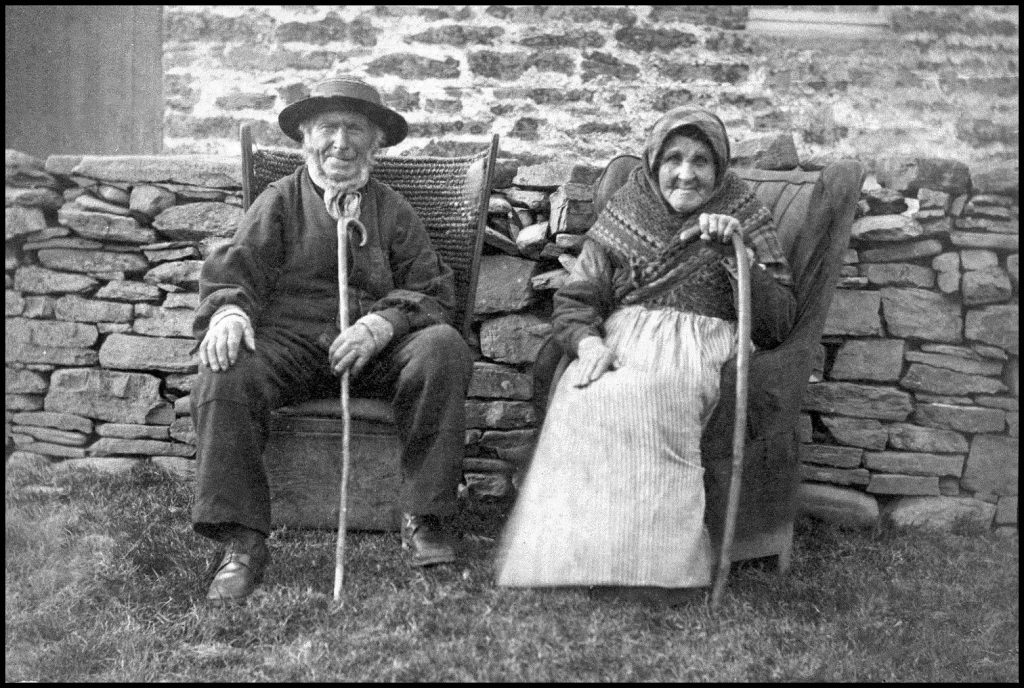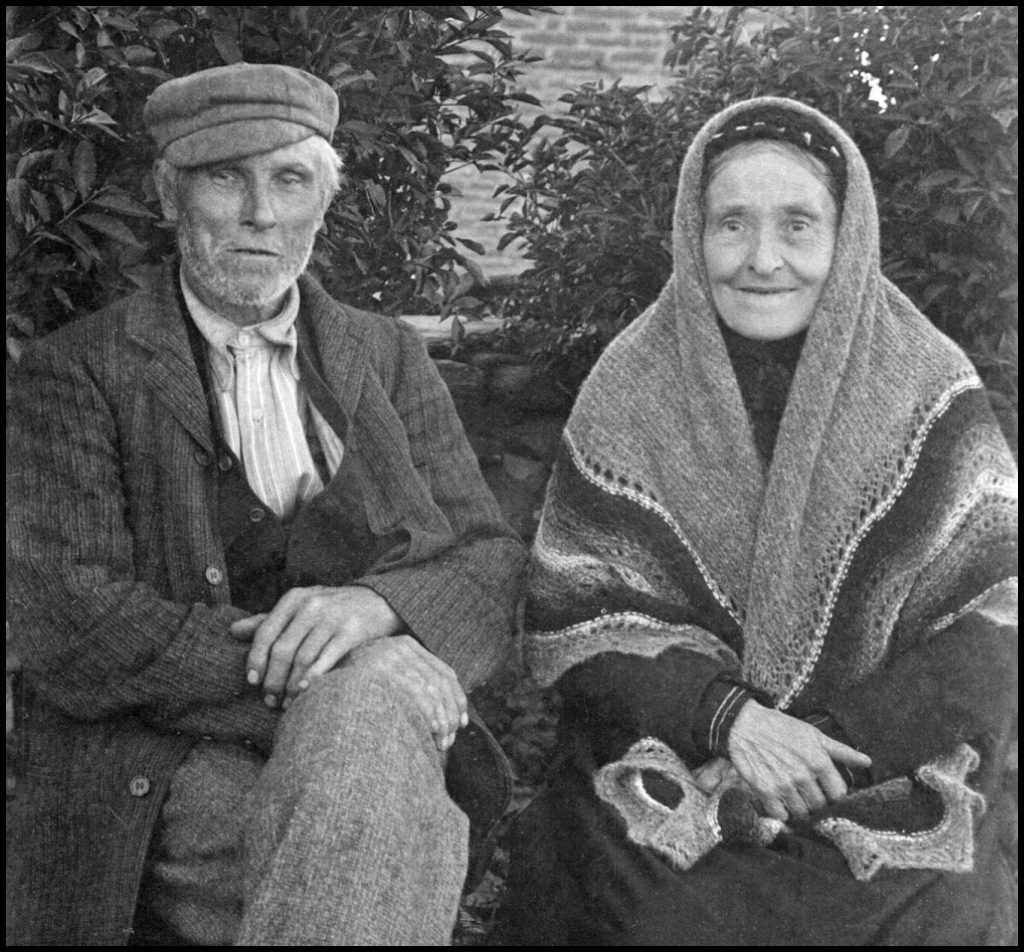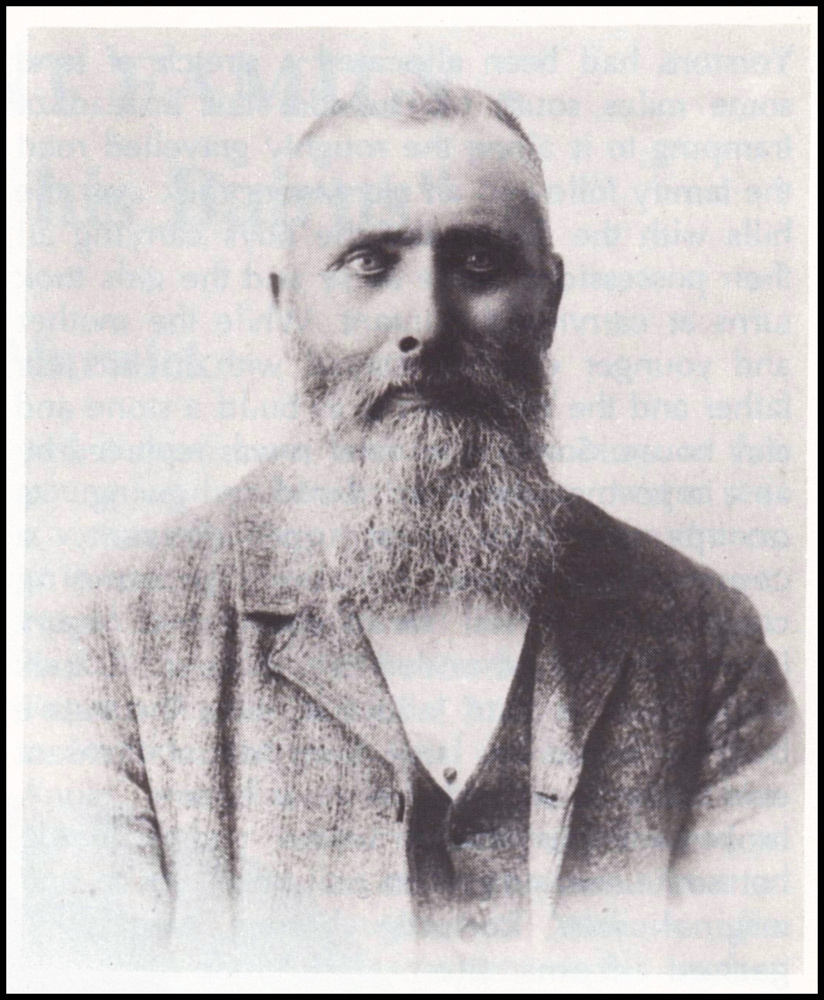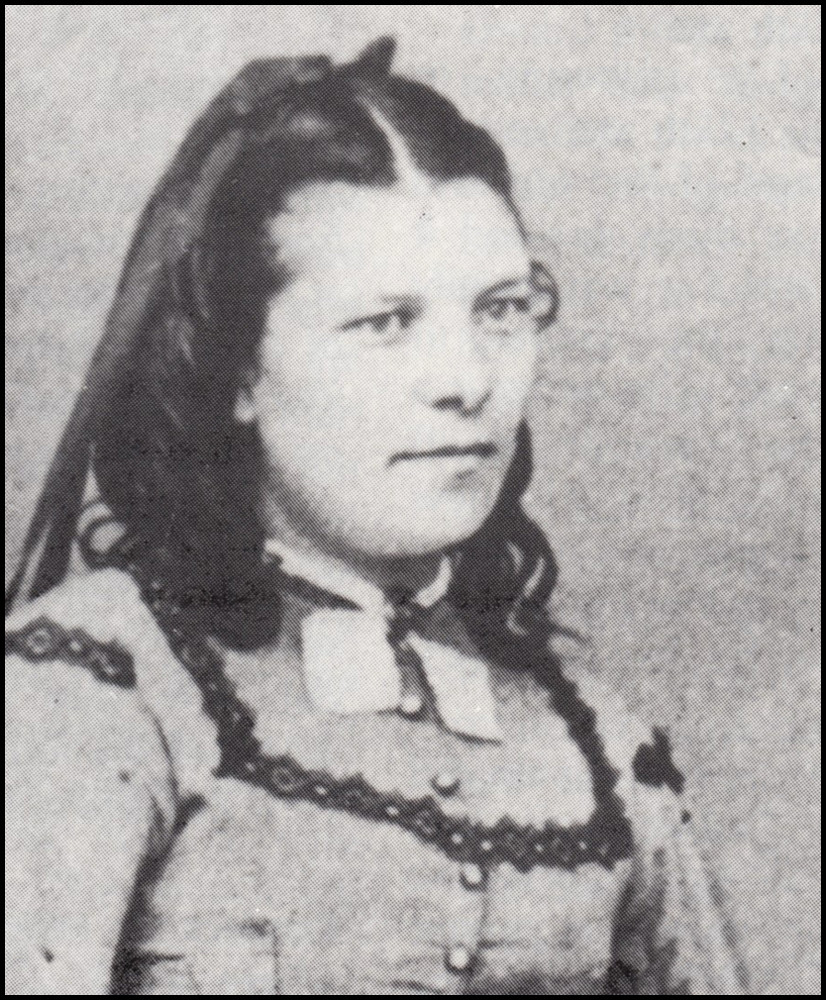by
Robert C. Marwick
In 1783 Hugh Marwick and his father Magnus took over the joint tenancy of the farm of Scockness in Rousay. Hugh was only seventeen years old but in all other respects already a man and ready to take on the responsibilities of the partnership. Ten years later he married Betsy Sinclair from a neighbouring farm and in the course of the next eighteen years she bore him ten children, every one of them a boy. In her old age Betsy was asked how many children she had had. Thinking, no doubt, of all these mischievous boys and never a girl to comfort a mother’s heart, she replied, “Ten devils.”
The two eldest devils, Magnus and Thomas, were married and still living at Scockness when their father died in 1820. They continued working the farm until evicted by the laird because of a dispute over kelp making. Thomas then took the tenancy of Banks for a few years before moving to Woo nearby. Tammy o’ Woo, as he was known, and his wife Ann Gibson from Broland had five sons and five daughters. All but two of them as well as Tammy himself would eventually emigrate to New Zealand.
The Free Church of Scotland in co-operation with a company in New Zealand organised large scale emigration from Scotland to Otago after New Zealand came under British rule in 1840. The city of Dunedin, named after the Scottish capital, was the creation of these early Free Kirk settlers. It is likely that the Woo Marwicks who were staunch members of the Free Kirk in Sourin took advantage of the sponsorship their church offered.
The eldest son Hugh who was a boat builder to trade was the first to go. He left in 1855 with his wife Margaret Sinclair from Swandale and their two children, Annie aged two and Elizabeth who was still just a baby in arms. The sadness of parting would soon give way to brighter thoughts of their future in a new land and it must have been a severe blow to this young family when baby Elizabeth died at sea, a victim of the cramped and harsh conditions of a sailing ship on a twelve-week voyage. Hugh and Margaret did not stay in New Zealand very long and soon set sail across the Tasman Sea for Australia. At their new home in Victoria they had four more children but Annie was the only one to marry. Her granddaughter who lives near Melbourne is one of my Australian correspondents. Another is a great granddaughter of William who emigrated about the same time as his brother Hugh and like him spent only a short time in New Zealand before trying his luck in Victoria where he married and settled down to raise a family of eleven children.
William’s eldest son, William Thomas, moved to Western Australia in the 1890’s when the goldfields around Kalgoorlie were luring people from far and wide. After a few years he bought some land and set to the back-breaking task of clearing it to make the productive dairy farm it was to become within a few years. Of William Thomas’s nine children one still survives aged eighty-five. A recent family tree from Western Australia shows almost 300 descendants of William Thomas in less than 100 years.
Three more of the second devil’s family were to follow Hugh and William to New Zealand in the late 1850’s, namely lsaac, Betsy and Mary. Little more is known of lsaac except that he got married but there do not appear to have been any children. Betsy had married Hugh Yorston in 1842 and had six children when they left for Dunedin in 1859. They sailed from the Clyde on June 10 and reached their destination ninety-three days later after a voyage on which four babies had been born (one of them to Hugh and Betsy) and eight children under the age of three had died. The Yorstons had been allocated a stretch of land some miles south of Dunedin but instead of tramping to it along the roughly gravelled road the family followed an old Maori track over the hills with the father and the boys carrying all their possessions while Betsy and the girls took turns at carrying the infant. While the mother and younger children stayed with friends the father and the others set to to build a stone and clay house. Some years later it was replaced by an imposing wooden building giving its occupants, both past and present, a commanding view of the surrounding countryside. It still bears the name Mount Pleasant which the Yorstons gave it. It took many years of hard labour to clear the native bush to create the large farm Mount Pleasant eventually became. It has now been broken up into smaller units but some measure of its original size can be gained from the eight-horse stable that still stands.
When Mary, who had gone out at about the same time as the Yorstons, arrived in Otago she met up with Richard Craigie whom she had known in Rousay and who had emigrated with his parents some years earlier. Soon they were married. Their first child died in infancy but another, named after his father, arrived the following year. Tragically Mary died a few months after the birth.
Back in Rousay the mother of the Woo family died in 1861. By that time five out of the ten children were overseas. Of those still in Rousay John and Margaret were married and settled in homes of their own. Tammy the second devil was by then sixty-five years of age and at home with him were Thomas Jr., Isabella and Ann who at sixteen was the youngest of the family. After a few months it was decided that the four of them should join the others in New Zealand. They left Rousay in the summer of 1862. For some years Tammy had been an elder in the Rousay Free Kirk and the kirk session minutes of 25 May 1862 record his resignation and in a glowing tribute speak of the session’s “high appreciation of his Christian character and worth and their great esteem for him as a personal friend.” After recording their regret at his departure the session expresses the hope that Mr Marwick and those of his family who accompany him “will continue to adorn the doctrine of God in that distant colony.”
Tammy’s nephew, Hugh Marwick, who was a son of Isaac the ninth devil, decided to accompany his uncle to New Zealand. Hugh was twenty-one years old and after a few years down under working as a carpenter and boatbuilder he returned to Rousay to marry the girl he had left behind. With his bride he set off for New Zealand once more and their first child Betsy Ann was born there. Before long however the family returned to Rousay and settled at Guidal where Hugh carried on business as a shopkeeper, carpenter and boatbuilder, registrar, school attendance officer and amateur dentist. He was the father of Dr Hugh Marwick.
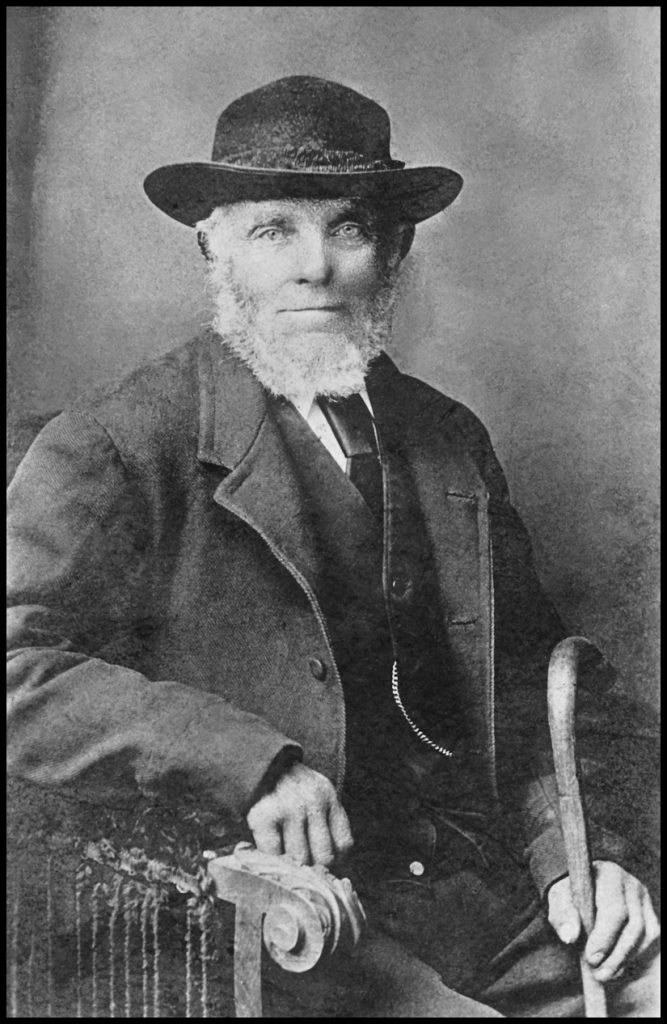
author, and Director of Education for Orkney in the 1930s and 40s.
[This, and the two photos above, are courtesy of the Tommy Gibson Collection]
When the last of the Woo family reached New Zealand they met Richard Craigie, the widower of Mary who had died a few months earlier. Before long Isabella and Richard had teamed up and eventually produced a further ten Craigie children. No doubt their union was frowned on, as a marriage between a man and a sister of his dead wife was outside the limits of acceptability at that time. Old Tammy lived out the rest of his days with Isabella and Richard at their farm of Craigielea. In a letter dated 28 October 1869, to his son Hugh in Victoria, Tammy writes of the kindness of Richard and Isabella. He wants for nothing and Richard is referred to as his best friend. Thomas Jr. is mentioned in this letter as working as grieve on Richard’s farm.
James Knarston, who was to become the husband of Ann, Tammy’s youngest daughter, ran away to sea from Stromness at the age of fifteen. After several years service in both the Royal and Merchant navies he opted for a life in New Zealand. A spell at the gold diggings followed before he and Ann settled at Taieri Mouth, south of Dunedin, where James spent the rest of his life as a general merchant. Unfortunately Ann did not survive the birth of their only daughter Maryann whose daughter, now in her 80’s, is one of my New Zealand correspondents.
The Craigies held a family gathering in Dunedin in 1973 to mark the 125th anniversary of the arrival in New Zealand of Richard and his parents. In 1988 some of them decided it was time to have another and this was hastily arranged to coincide with the arrival in Dunedin of my wife and myself. (The writer is a great-great-grandson of the seventh devil). Through my interest in family history I knew about the New Zealand Craigies and it was a great thrill to walk into a gathering of 200 descendants of Richard and his two Marwick wives.
New Zealand is a very young country; man did not set foot on it till a mere 1200 years ago and no European settlement of any significance took place until after 1840. New Zealanders cannot see far back into their history without looking beyond their own shores to places such as Scotland from where their ancestors set out in search of a better life. They acknowledge the debt they owe to these courageous pioneers who laid the foundations of the pleasant place New Zealand is today.
[Transcribed with permission from the editors of The Orkney View – issue No 42, published in 1992]
